How to effectively control aphids on peppers without harming the crop
Bell peppers are loved in our country and grown in regions with both warm and cold climates. They have learned to grow greenhouse varieties even in Siberia. This plant attracts vegetable growers with its taste and beneficial qualities of the fruit.
There is an urgent question about methods of controlling parasites on bell peppers - in particular, peppers are susceptible to attacks by aphids. In the article we will tell you the reasons for its appearance and how to fight aphids with folk and other means at home.
What are aphids
Aphids, family Aphididae, are a common plant parasite.. Summer residents and gardeners know about the fertility of aphidids. Aphids live in colonies, reproduce and spread quickly. Parasitic insects are attracted to garden plots by food and the lack of preventive measures.
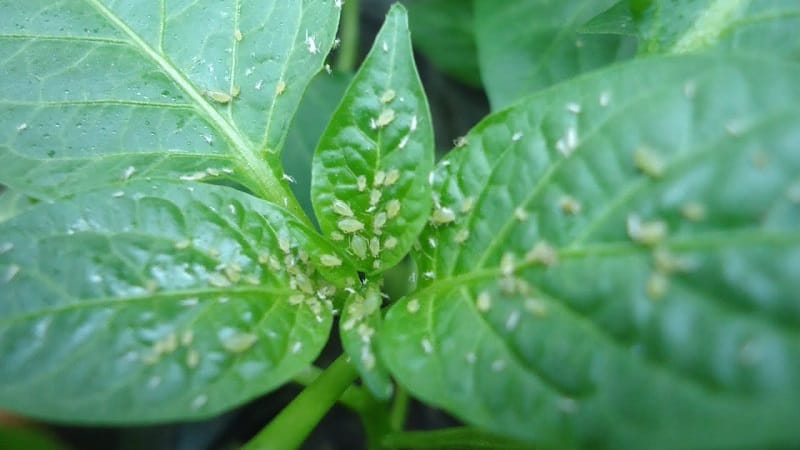
What types of aphids attack peppers?
The following types of aphids parasitize bell peppers:: peach, nightshade and greenhouse.
The peach (green) aphid chooses pepper as a food plant.. In addition to peppers, this type of insect attacks melons, cabbage, lettuce, and some types of flowers, but it prefers peppers most of all. This small parasite infests the stem and lower part of the leaves, causing them to curl and wrinkle.
Nightshade (black) aphid is one of the smallest pests, measuring only 0.3 mm.. Settles on the trunk of the plant, on the back of the leaves. These pests feed on plant sap.Young shoots of a succulent crop are attractive to them, so black aphids on pepper seedlings are a common occurrence.
These insects require amino acids and carbohydrates to survive.. Sweet pepper is a juicy plant that contains these substances in abundance. During their life, aphidids secrete a sticky substance - honeydew, which attracts ants. Therefore, if aphids appear, then an anthill will definitely appear nearby.
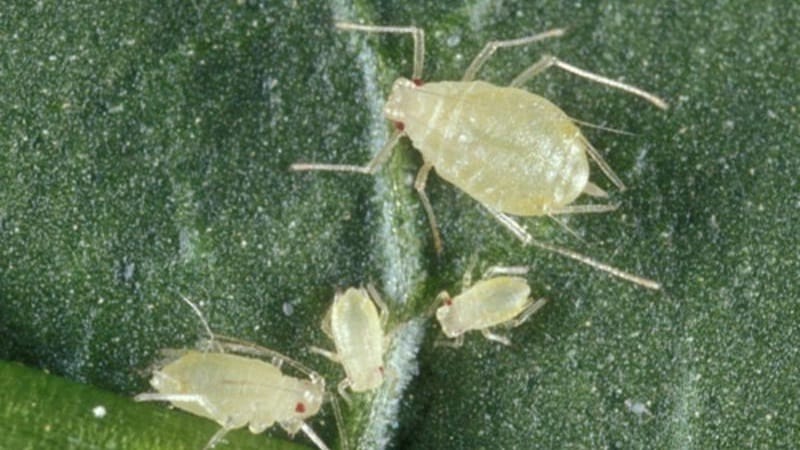
This is a mutually beneficial neighborhood: ants protect aphidid colonies from ladybugs and hoverflies, and they secrete honeydew in excess. But the sweet solution that parasites secrete is not only a treat for ants, but also the basis for the development of fungal diseases.
About other pepper pests:
How to get rid of caterpillars on peppers
Causes
Females lay fertilized eggs in the fall. They hide them in the bark of plants and shrubs. Ants hide aphid eggs in an anthill for the winter - these are the main guards of aphidids. In the spring, females with wings appear and do not need a male to reproduce.
Young female aphidids are capable of reproducing on their own (this method of reproduction is called “parthenogenesis”) at incredible speed. Each of them produces hundreds of larvae. After a couple of weeks, the small larva turns into an adult asexual parasite that reproduces by parthenogenesis.
Reference. Closer to autumn, male and female aphidids appear and lay eggs for the winter.
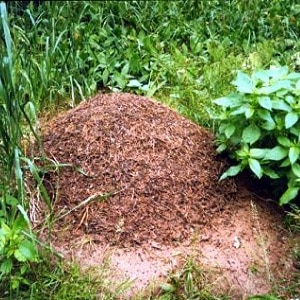 Reasons for the appearance of aphids on sweet peppers:
Reasons for the appearance of aphids on sweet peppers:
- the presence of an anthill on the site or next to the garden;
- the garden is overgrown with weeds;
- a flower bed in close proximity to the pepper bed;
- soil or seedlings with parasite larvae;
- unfavorable temperature;
- the roots of the plants were excessively flooded with water, irregular watering.
Symptoms
Aphid larvae are so small that it is difficult to notice their appearance on plants with the naked eye.. Vegetable growers notice the pest when the pepper is already sick.
The first signs of aphidid infection:
- the seedlings turn yellow, dry out and die;
- buds fall off, fruit ovaries are not formed;
- a sticky substance covers the surface of the pepper with a thin layer;
- the bush shines and becomes sticky to the touch;
- small, creeping parasites cover the underside of the leaf;
- plant growth stops.
Pest control should begin as soon as possible, otherwise the aphids will destroy the entire crop.
Pest control methods
Aphids are a serious enemy of sweet peppers. What should a gardener do when faced with this problem? There are three methods to combat aphidids:
- chemical – quickly gets rid of aphids (cannot be used during flowering plants);
- biological - the natural properties of certain species of plants, birds, animals and insects are used to protect plantings from aphidids;
- folk - recipes for getting rid of parasites, which have been tested by summer residents from their own experience.
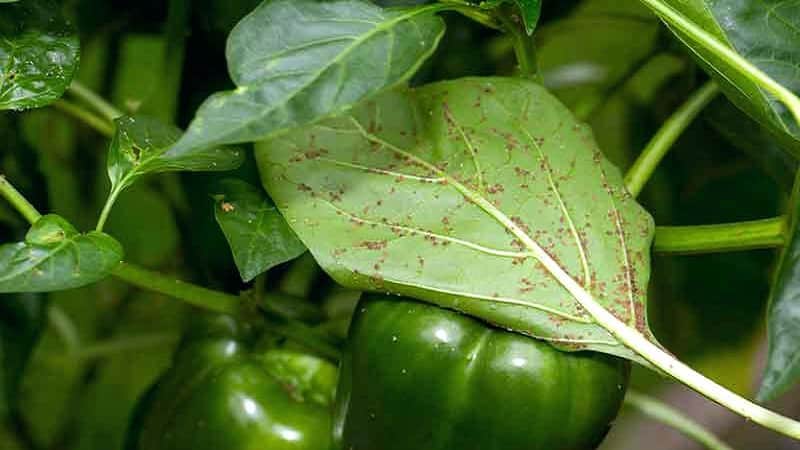
Biological method
When growing peppers in open ground, it is advisable to lure aphid enemies. One week is enough for birds and insects to rid the entire area of it without harming the seedlings. Birds will destroy pests on the site if you create comfortable conditions for them. To attract sparrows and tits to your site, leave food for them.
The larva of the seven-spotted ladybug destroys a hundred adult harmful beetles and up to three hundred larvae in one day. Aphelinus and aphidius parasites are the main enemies of aphids.They lay eggs in the body of the aphidid. They feed on aphids and ground beetles, lacewings, earwigs and some types of spiders.
Protect beneficial insects, bring seven-spotted ladybugs, aphelinus and aphidius to the beds. Iridescent flies and hover flies can be easily attracted by planting herbs in pepper beds. First, it is better to study photos of insects so as not to confuse them and bring pests to the site.
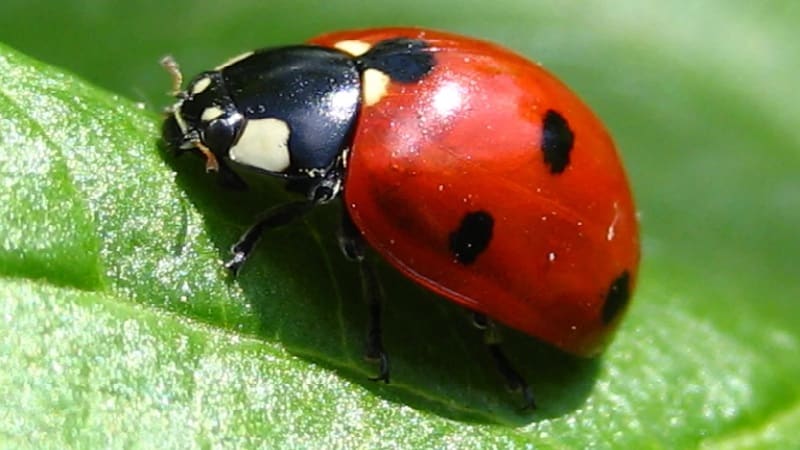
In addition to birds and insects, nature has created plants that can fight harmful insects: Dalmatian chamomile, onion, garlic. Plant these plants near peppers and they will repel aphids.
Attention! Mallow, begonia, and viburnum attract aphidids. Plant these plants away from the pepper beds, and the parasites will switch to them.
The smell of some spices – carrot tops, dill, parsley – also repels harmful insects.
Chemicals
Insecticidal and organic chemicals are produced to combat aphids. How to treat peppers against aphids during fruiting? In this case, owners of summer cottages use biological preparations to control pests. Their main advantages are that they do not harm the soil microflora, and the pepper harvest can be eaten within 24 hours after processing the plants.
Attention! Chemical plant pest control agents are toxic and dangerous to humans and animals.
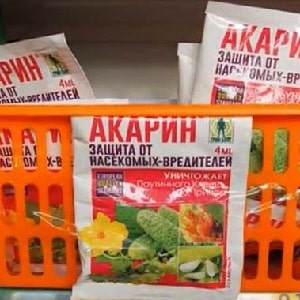 Biological agents include:
Biological agents include:
- "Akarin". To treat a bed with an area of 10 m², 1 liter of solution will be required. The effectiveness of the product decreases at temperatures below +18°C.
- "Fitoverm M" used to combat fungal plant diseases. The drug is produced in the form of paste and ampoules. One ampoule is diluted into 4 liters of solution.It only affects adults, which die 72 hours after treatment. This drug has no effect on larvae. The treatment is repeated 3-4 times.
Insecticidal preparations act quickly and effectively. Their main advantage is the destruction of parasites in one go. The most effective insecticides contain neonicotinoids and pyrethroids.
Important! During flowering, insecticidal preparations are not used.
Let's consider most popular insecticides:
- The drug "Intavir" The plants are treated in dry weather twice with an interval of 7 days. The drug is released in the form of tablets. The solution is made at the rate of 1 tablet per bucket of water. This amount is enough to treat crops with an area of 10 m². The protection lasts 2-4 weeks.
- "Karbofos" – contact insecticide. Only those pests that are exposed to the solution die. Treatment is carried out 2 times with an interval of 10 days. The effect of the insecticide lasts 8-10 days. The solution is prepared at the rate of 1 tbsp. l. "Karbofos" per 10 liters of water.
- "Aktara" – a drug of contact-intestinal action. The main advantages of this insecticide are that it does not decompose and does not accumulate in the soil, and does not cause habituation in insects. The product is produced in the form of ampoules of 5 ml. 1 ampoule is diluted in 10 liters of water. Treatment is carried out twice at intervals of a week. The effect of the drug begins after 30 minutes.
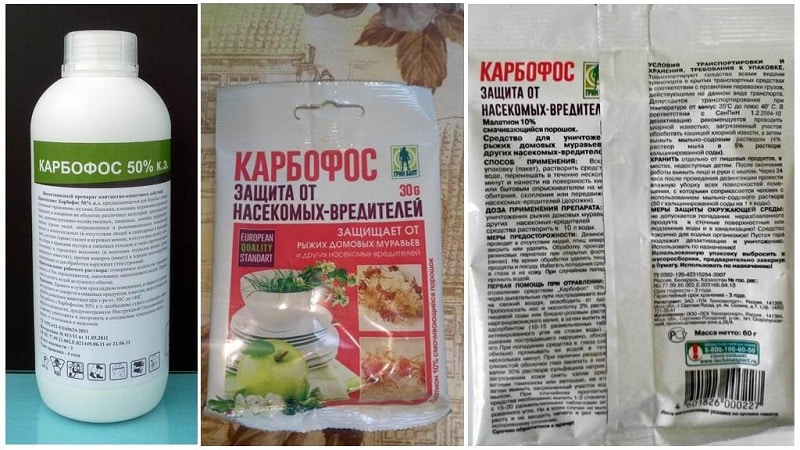
Folk remedies
Folk remedies are safe for humans, but they are more effective in preventing aphid attacks. Experienced summer residents advise fighting aphids using soda, ammonia or hydrogen peroxide:
- hydrogen peroxide – mix 50 ml of hydroperite, 2 tbsp. l. medical alcohol, 0.5 tsp. liquid soap and 900 ml of water, spray the plants;
- ammonia - prepare a solution at the rate of 20 ml of ammonia per 10 liters of water, spray on plants (ammonia repels pests with its smell);
- baking soda - make a solution at the rate of 1 tbsp. l. grated laundry soap and 2 tbsp. l. soda per 1 liter of water, spray pepper bushes.
Read also:
Prevention
Prevention is the most effective method of controlling aphids. This is painstaking, systematic work, but the time spent will pay off with an excellent harvest. It is always easier to prevent a problem than to fight it.
Preventive measures used in the fight against insect pests:
- disinfection of seeds (treatment with a solution of manganese and garlic) and soil - warming (freezing) the soil;
- soil cultivation on the site - weeding and digging, treatment with garlic infusion;
- fighting ants on the site;
- manual collection and destruction of the pest.
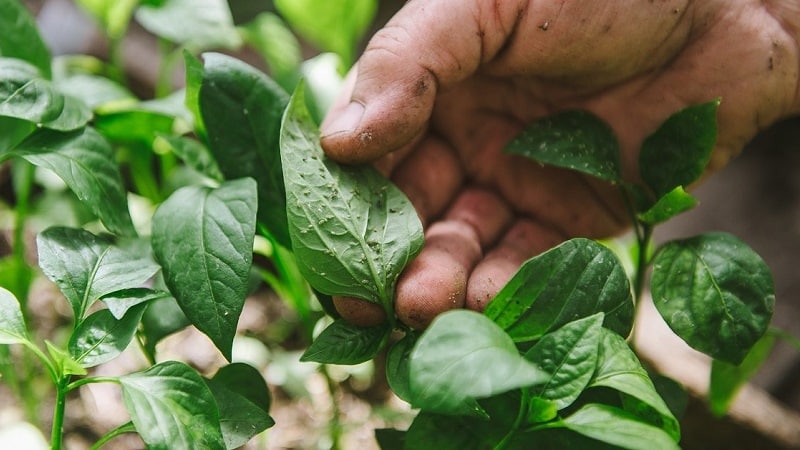
As a preventive measure, the condition of the site is monitored, remove weeds and dry grass in a timely manner in the fall. Purchase seedlings only from trusted sellers. Every day, remove areas of plants that have been damaged by aphids.
Important! Timely watering is an indispensable condition for pest control.
How can you treat pepper seedlings against aphids for preventive purposes? Summer residents often use onion and garlic tincture, since the specific smell repels aphid larvae.
Conclusion
Aphids are one of the most dangerous enemies of garden crops. Among the main reasons for its appearance are the presence of an anthill on the site and errors in agricultural technology.
Only comprehensive care of plants, breeding entomophages on the site, and regular preventive measures can prevent the appearance of such a dangerous parasite in the garden plot.